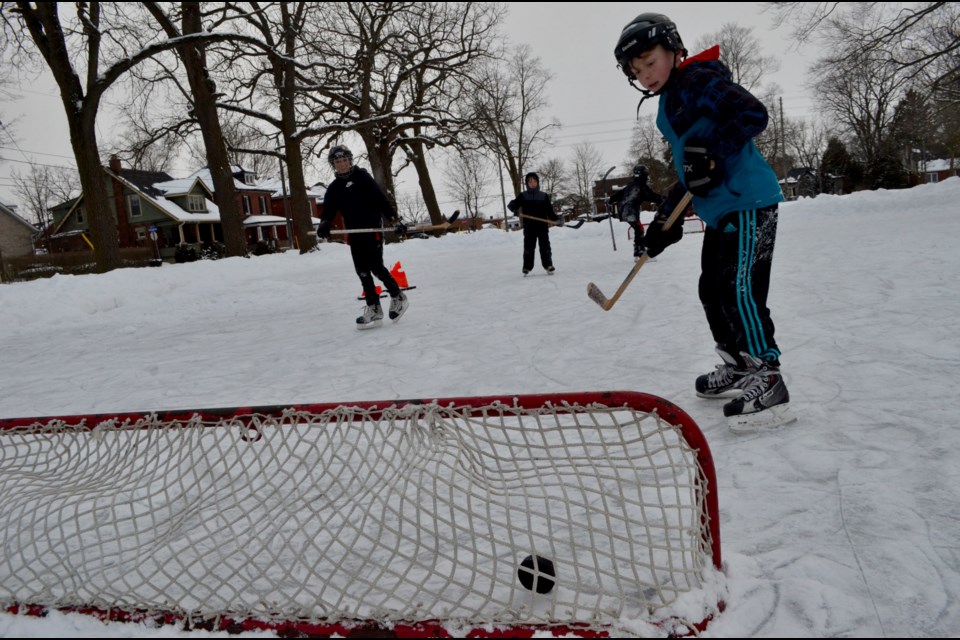The forecast is calling for extreme cold temperatures this weekend, which is bad news for most people but great news for head hoser Aaron Duncan and fellow ice maker Stewart McDonough at Sunny Acres Park rink.
“I was given the auspicious title head hoser, during a noble ceremony from the previous head hoser who did it for 14 years,” said Duncan. “There are some calculations as to how far it goes back. We think it might be 80 or 90 years.”
The tradition of maintaining an outdoor rink every year at Sunny Acres Park has been passed down through successive generations since the early 1900s.
“This is one of, if not, the oldest outdoor rinks in the city,” said McDonough. “There is photographic evidence that it is more than 80 years old. It makes it a pretty amazing thing to think you are just a part of generations of parents who have been out here just keeping this rink going.”
It truly is a team effort.
“We have a team of about 15 or 20 guys signed up and a crew of guys that come out each night,” said Duncan. “Their job is to clear it and maintain it. It’s large enough that there can be three or four guys each night and often it only takes two.”
Sunny Acres Park is one of more than 30 registered outdoor rinks maintained through the City of Guelph Community Ice Rink program.
“The city has given us the infrastructure and they provide the hoses and low-profile hockey nets,” said McDonough. “They help us out with some maintenance if the hoses break or we are having trouble. They do that part at the beginning and it is up to each neighbourhood to come up with the volunteers to run it. There are neighbourhoods that have the potential for rinks but can’t get the required amount of people.”
The city also provides an operating grant to help pay for shovels and additional expenses.
“We used to have a system where you would get 10 bucks a day for every skateable day until you got to 50 days, which is $500,” said Duncan. “The city changed that and said, ‘If you make a good effort, we will give you your $500. I still have to keep track of all the water used and all of the days it’s used. My official goal is to get to 50 skateable days so we have really earned our $500.”
There were concerns that wouldn’t happen this year.
“I looked at the forecast,” said Duncan. “If we can get to March Break with a steady streak, we might get to 50 days. We were worried about it a little while ago.”
Weather, specifically, temperatures, are the main factor.
“It has to be cold at night and not getting too much above zero during the day,” said Duncan. “The cold at night is the most important part. One of the tricky parts is when the days get longer. Now, it progressively gets worse because the sun is in the sky more and the sun just mushes it and slows it down.”
It takes a lot of water and commitment from volunteers to get the rink established.
“If the weather is good and the rink is in good shape, we will hose from Sunday night until Thursday night,” said McDonough. “When we are trying to build the rink up it is all-hands-on-deck, whenever and whoever can flood on any given day.”
It also requires a lot of shoveling especially after a major snowfall.
“If you have a shovel day, more people are necessary,” said McDonough. “Whenever we are out hosing new people to the community pop out of the woodwork. They are like, this is amazing. How can we be a part of it? When you have young families moving in, you have parents who are eager to help out."
Both Duncan and McDonough have three children each who spend a lot of their winter days on the rink
“There are a lot of kids in the neighbourhood and that is one of the reasons we do this,” said Duncan. “This rink also attracts serious shinny hockey players. People show up and play real legit full, heavy duty hockey games. They are going back and forth until 10 or 11 at night. There are legendary stories of people showing up at 2 a.m. complete with full goalies and everything. That was years ago.”
They have introduced a new, soon-to-be traditional, sport at the rink called crokacurl.
“It is something pretty ridiculous we call the maple syrup of sports,” said McDonough. “It was invented in Winnipeg four years ago and we started it up the next year, so this is our third annual Crokicurl Tournaspiel.”
It combines two quintessentially Canadian games, crokinole and curling.
“We have set up the ice exactly as you would a crokinole board and instead of little wooden pucks we have big curling rocks,” said McDonough. “People can come this Saturday afternoon to just play. Sunday from 11 a.m. to around 3 or 5 p.m. is our sold-out tournament. People can come again and play Sunday evening or all-day Monday for pick up crokacurl.”



